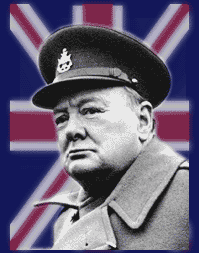Birth: November 30, 1874, Blenheim Palace, near Oxfordshire, England
Death: January 24, 1965. Buried at Blenheim Palace
Early Influences:
* According to his own account, he loved his Mother dearly, "but at a distance."
* Was not close to his father, Lord Randolph
* His nanny, Mrs. Everest, was a close friend throughout his life
* Grew up as the son of a British noble
Education:
* Attended private school from age of seven
* Entered Harrow in 1888; later indicated he was not impressed with his education
* Entered Sandhurst Royal Military College in 1893 after three attempts to pass the entrance test
* Joined the army in 1895
Major Accomplishments:
* Elected to Parliament as a Conservative in 1900
* Joined the Liberal Party and became the president of the Board of Trade in 1904
* Served as Under Secretary of State for the Colonies from 1906-08
* Served in the military in France during World War I
* Secretary of War 1918-21
* Chancellor of the Exchequer 1924-29
* Served as First Lord of Admiralty when World War II broke out
* Prime Minister from 1940-45 and 1951-55
* Knighted and awarded Nobel Prize for Literature in 1953 for his six volume history of World War II
Significance:
* Became a national hero after his escape from captivity during the Boer War
* Supported Edward VIII during his abdication despite the government's disapproval
* Returned Britain to the gold standard while Chancellor of the Exchequer
* Led Britain through World War II
* Refused to make peace with Germany while Hitler was in power
* With Roosevelt and Stalin, developed plan for victory over Germany
* During a speech in 1946, warned of the expansive tendencies of the Soviet Union
coining the term 'iron curtain'.
Links
* Nuclearfiles
* Images of Greatness
Contemporaries:
* Edward VIII - King of England
* Neville Chamberlain - Prime Minister of Great Britain
* Franklin D. Roosevelt - President of the United States
* Joseph Stalin - Russian Premier


